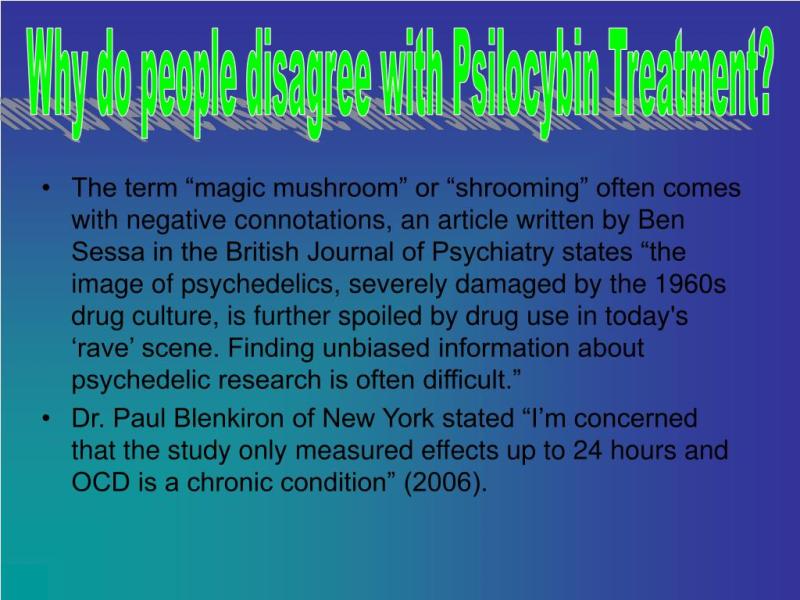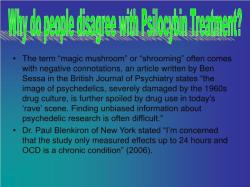Is psilocybin the key to treat obsessive compulsive disorder?
Psilocybin, a naturally occurring psychedelic compound found in certain mushrooms, has shown promise in preliminary studies as a potential treatment for various mental health conditions, including obsessive-compulsive disorder (OCD). However, it's crucial to note that the research is still in its early stages, and definitive conclusions regarding psilocybin's efficacy and safety for OCD treatment have not yet been established. Here are some insights:
Limited Studies: There's limited clinical research specifically focused on psilocybin's direct effects on OCD. Most studies have primarily explored its potential in treating conditions like depression, anxiety, PTSD, and addiction.
Mechanism of Action: Psilocybin interacts with serotonin receptors in the brain, particularly the 5-HT2A receptors. This interaction is believed to influence perception, mood, and cognition. OCD involves disruptions in the brain's serotonin system, which is why researchers speculate that psilocybin's effects could have implications for OCD treatment.
Preliminary Findings: Some studies and anecdotal evidence suggest that psychedelic-assisted therapies, including those involving psilocybin, may have beneficial effects on reducing symptoms of OCD, anxiety, and depression in some individuals. However, these findings are preliminary and require further investigation through controlled clinical trials.
Safety Concerns and Caution: Psilocybin and other psychedelics are potent substances that can cause intense perceptual and psychological effects. Safety concerns regarding their use include the potential for adverse psychological reactions, exacerbation of pre-existing conditions, and the risk of triggering psychosis or trauma.
Regulatory Status: Psilocybin is classified as a Schedule I controlled substance in many countries, including the United States, which restricts its use in clinical research. Despite this, there has been growing interest in studying its therapeutic potential, leading to increased research efforts and potential changes in regulatory attitudes toward psychedelic substances.
While the early findings are intriguing and suggest potential avenues for treating OCD, more extensive and rigorous clinical trials are necessary to determine the safety, efficacy, proper dosages, treatment protocols, and long-term effects of psilocybin specifically for OCD.
Given the complexity and severity of OCD, individuals seeking treatment should consult healthcare professionals who specialize in mental health to explore evidence-based therapies and treatments that are currently approved and established within the medical field. It's important to approach emerging treatments with caution until they undergo rigorous scientific scrutiny and receive regulatory approval.
Psilocybin, a naturally occurring psychedelic compound found in certain mushrooms, has shown promise in preliminary studies as a potential treatment for various mental health conditions, including obsessive-compulsive disorder (OCD). However, it's crucial to note that the research is still in its early stages, and definitive conclusions regarding psilocybin's efficacy and safety for OCD treatment have not yet been established. Here are some insights:
Limited Studies: There's limited clinical research specifically focused on psilocybin's direct effects on OCD. Most studies have primarily explored its potential in treating conditions like depression, anxiety, PTSD, and addiction.
Mechanism of Action: Psilocybin interacts with serotonin receptors in the brain, particularly the 5-HT2A receptors. This interaction is believed to influence perception, mood, and cognition. OCD involves disruptions in the brain's serotonin system, which is why researchers speculate that psilocybin's effects could have implications for OCD treatment.
Preliminary Findings: Some studies and anecdotal evidence suggest that psychedelic-assisted therapies, including those involving psilocybin, may have beneficial effects on reducing symptoms of OCD, anxiety, and depression in some individuals. However, these findings are preliminary and require further investigation through controlled clinical trials.
Safety Concerns and Caution: Psilocybin and other psychedelics are potent substances that can cause intense perceptual and psychological effects. Safety concerns regarding their use include the potential for adverse psychological reactions, exacerbation of pre-existing conditions, and the risk of triggering psychosis or trauma.
Regulatory Status: Psilocybin is classified as a Schedule I controlled substance in many countries, including the United States, which restricts its use in clinical research. Despite this, there has been growing interest in studying its therapeutic potential, leading to increased research efforts and potential changes in regulatory attitudes toward psychedelic substances.
While the early findings are intriguing and suggest potential avenues for treating OCD, more extensive and rigorous clinical trials are necessary to determine the safety, efficacy, proper dosages, treatment protocols, and long-term effects of psilocybin specifically for OCD.
Given the complexity and severity of OCD, individuals seeking treatment should consult healthcare professionals who specialize in mental health to explore evidence-based therapies and treatments that are currently approved and established within the medical field. It's important to approach emerging treatments with caution until they undergo rigorous scientific scrutiny and receive regulatory approval.


